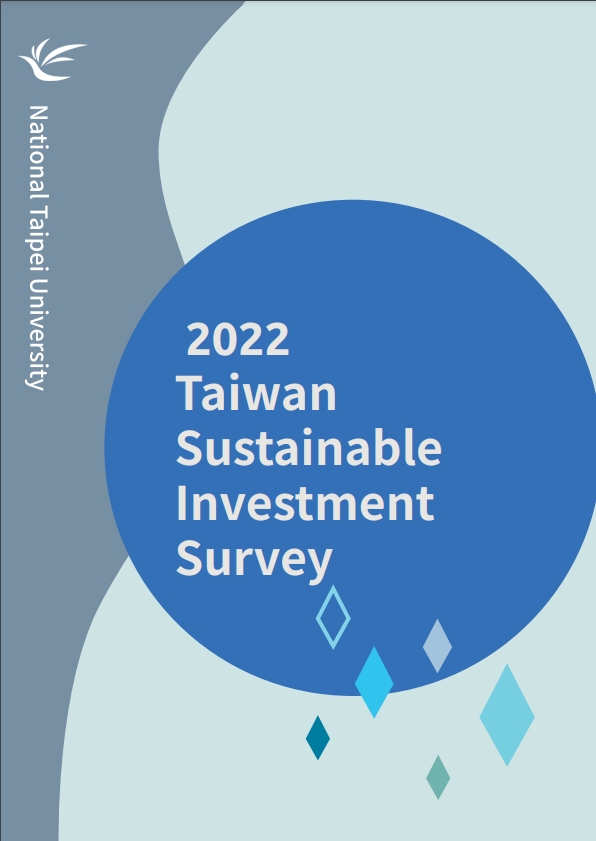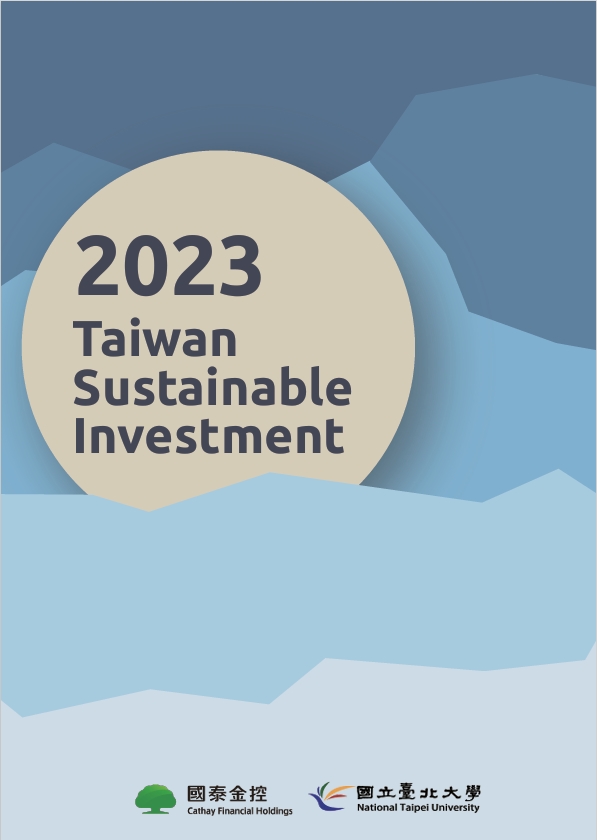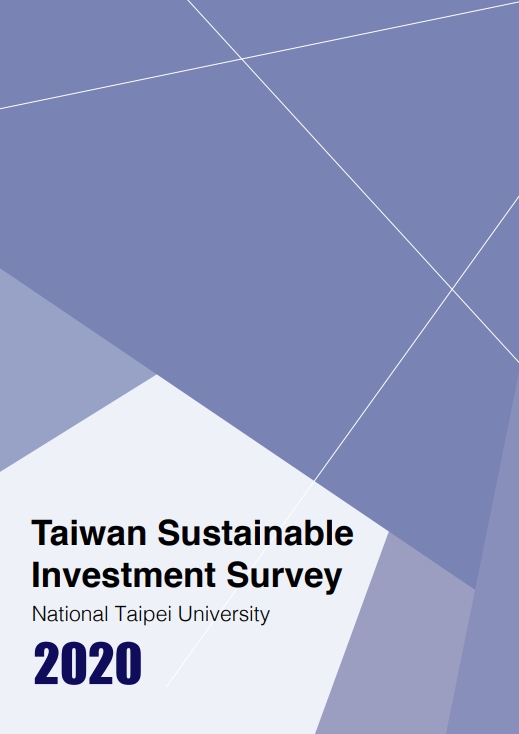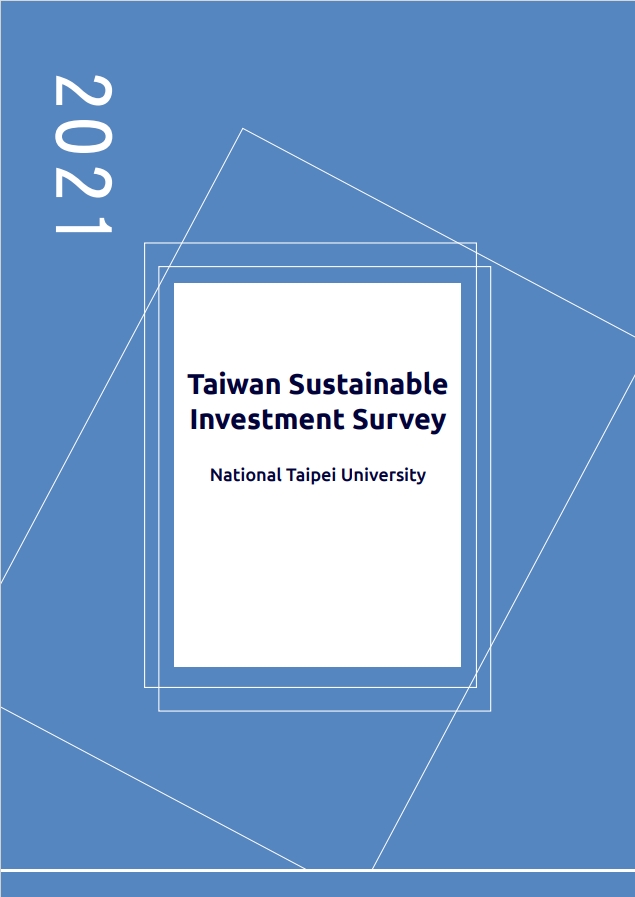

《2022 Taiwan Sustainable Investment Survey》Full Report
Despite the turmoil in the stock market caused by the Russia-Ukraine war, black swan events, and the resurgence of the pandemic, the results of the 2022 Taiwan Sustainable Investment Survey suggest that there has been growth in the amount of sustainable investment in Taiwan, which is an incredible feat. There was significant growth in thematic investing and impact investing, as well as the number of institutional investors engaging in sustainable investment. Additionally, the proportion of sustainable investment among the insurance sector and government funds also increased. Meanwhile, we observed that some institutional investors were aware of the risks of climate change, and we further added questions to inquire about the challenges they faced in sustainable investment. The results provide a reference for stakeholders to jointly promote the development of sustainable investment in Taiwan.
Continuous growth in sustainable investing
The results of the 2022 survey showed that the total amount of assets under management (AUM) was approximately NT$51.3 trillion, an 8.2% increase from last year’s NT$47.5 trillion; the total amount of sustainable investment assets was NT$20.3 trillion, a 15.3% increase from last year’s NT$17.6 trillion; and sustainable investments accounted for 39.6%, a 7% increase from last year’s 37%. The main sustainable investment target in Taiwan was foreign bonds, which accounted for 55%, a total of NT$9.7 trillion; this was followed by Taiwanese stocks, which accounted for 20%, a total of NT$3.5 trillion. The trends of these figures were similar to the 2021 survey results. Meanwhile, the percentage of institutional investors engaging in sustainable investing was 73%, somewhat similar to last year. The amount of sustainable investments among insurance companies (life and property and casualty insurance companies), securities consulting and securities investment trust and consulting companies, and government funds had grown to NT$17.2 trillion, NT$1.5 trillion, and NT$1.5 trillion, respectively. In addition, the proportion of sustainable investment among insurance companies and government funds had increased, while that of securities investment trust and consulting companies had decreased slightly.
Negative/exclusionary screening and ESG integration were the most popular sustainable investing methods; impact investing and thematic investing grew significantly
Similar to last year’s trend, the amount of sustainable investment through negative/exclusionary screening remains the highest at NT$13 trillion, followed by ESG integration at NT$8.7 trillion. A total of 97% (28) of institutional investors excluded controversial weapons through negative/exclusionary screening, while some added coal mining and its related22 upstream and downstream industries to the exclusion list this year. Besides, the amount invested through impact investing had a low base period but high growth (117%). However, institutional investors did not publicly disclose the process of impact assessment alongside the monitoring results, and only several institutional investors used this method; thematic investing had the second highest growth at 62%, with renewable energy and energy efficiency as the primary investment themes. Moreover, green bonds were the primary theme in bond investing, which indicates that low-carbon themed investments have attracted considerable attention and are gaining traction in the Taiwanese market.
An increasing number of institutional investors are engaging in sustainable investment
The survey results showed that 53% (36) of institutional investors followed up ESG engagements by carrying out long-term tracking of ESG performance through in-person visits. This was a 44% increase compared to the 43% (25) of investors last year. Also, 16% (11) of institutional investors chose to follow up ESG engagements by expressing ESG expectations through an open letter, while 16% (11) chose to present proposals that pertain to ESG issues at shareholders' meetings. The results indicate a growth in the number of institutional investors with ESG engagements. We suggest that those who have yet to do so improve their engagement performance, and for those who are doing so, we suggest they disclose the outcomes of their engagements to increase the transparency of enterprise engagement.
Some institutional investors included climate risks in their investment decision-making process
In this year's survey, we added questions related to climate change, in order to survey institutional investors' level of awareness and countermeasures toward climate change issues. Around 30% of institutional investors had prepared countermeasures toward climate risks or had included climate change risk analysis and management in their investment decision-making process. Around 20% had designated quantification goals for low-carbon transition in their investment portfolio and had used various methods and tools to perform scenario analysis and evaluate the impact of climate change risks. Moreover, the item on compliance with relevant sustainable investing initiatives showed that 32% (22) of institutional investors were compliant with the Task Force on Climate-related Financial Disclosures (TCFD) initiative, while 18% (12) were compliant with the Partnership for Carbon Accounting Financials (PCAF) initiative. We recommend that institutional investors who have yet to develop countermeasures toward climate change-related risks refer to these methods, so as to promote the growth of sustainable financing in Taiwan.
Challenges in sustainable investing faced by the institutional investors: A lack of disclosed data concerning corporate sustainability-related issues, and the difficulty of measuring the impact of sustainable investing
In this year's survey, we added a question regarding the challenges of engaging in sustainable investment to provide references for stakeholders to promote the development of sustainable investment in Taiwan. A total of 72% (49) institutional investors responded "There is a lack of disclosed data concerning corporate sustainability-related issues" and "It is difficult to measure and perform cross-company comparisons on the ESG performance of sustainable investment targets" as the main challenges they were facing. A total of 56% (38) of institutional investors responded "It is difficult to measure and define the impact of sustainable investing", while 32% (22) responded "High investment costs" in the questionnaire. As a result, the lack of transparency and comparability of sustainability data as well as the difficulty of measuring the impact of sustainable investing are two pressing issues in sustainable investing. The results provide a reference for the collective development of solutions to resolve such issues and improve the status of sustainable investment in Taiwan.

《2023 Taiwan Sustainable Investment Survey》Full Report
In 2022, global inflation–exacerbated by the Russia–Ukraine War has prompted the Federal Reserve Bank to raise its interest rates, which in turn has reduced hot money flows, increased the volatility of the global stock market, and lowered market performance. Furthermore, due to the surge of local COVID-19 cases, Taiwan domestic pandemic-related insurance claims reached NTD 211.6 billion, which simultaneously reduced the amount of assets under management (AUM) and sustainable investments in 2022. Despite these setbacks, the proportion of sustainable investments in Taiwan has generally continued to grow.
A higher percentage of institutional investors are engaging in sustainable investing as well as the proportion of sustainable investments
According to the results of the 2023 Taiwan Sustainable Investment Survey, institutional investors engaging in sustainable investing accounted for 80% of the total respondents. For the first time, the percentage of the total amount of sustainable investments in Taiwan exceeded 40%. In particular, the proportion of securities investment trusts and consulting companies engaging in sustainable investing was 33% this year, up 14% from last year’s survey, suggesting that both types of firms have a significantly higher awareness toward sustainability-related issues. However, due to the impacts of the macroeconomic environment, the total amount of AUM was NTD 49.5 trillion this year, a 4% drop from last year’s NTD 51.3 trillion; the total amount of sustainable investment assets was NTD 19.9 trillion, a 2% drop from last year’s NTD 20.3 trillion. The overall trends were consistent with the Japan Sustainable Investment Forum’s (JSIF) survey results.
A higher percentage of institutional investors in compliance with climate change initiatives, with climate change management included in the investment decision-making processes
According to this year’s survey, the percentage of institutional investors in compliance with climate change initiatives was significantly higher than that of the previous year, with the Task Force on Climate-related Financial Disclosures (TCFD) being the most popular initiative at 60% (38 investors), followed by the CDP (formerly the Carbon Disclosure Project) at 41% (26 investors), Partnership for Carbon Accounting Financials (PCAF) at 35% (22 investors), and Science Based Targets initiative (SBTi) at 33% (21 investors). Moreover, the number of institutional investors who included climate risks in their investment decision-making process was 77% (13 investors) higher than in last year’s survey. In response to climate risks, 82% (55 investors) adopted measures such as measuring the carbon emissions of their investment portfolio, negotiating and voting on climate change-related issues with investee companies, disinvesting in upstream and downstream industries related to fossil fuels, investing in climate change-related themes, and investing in green bonds. These changes in number show that institutional investors have attached greater importance to environmental sustainability issues.
Negative/exclusionary screening and ESG integration remain the mainstream method of sustainable investing in Taiwan, followed by stakeholder action and corporate engagement, while impact investing has the most significant growth
Survey results over the past three years have shown that the most common method of sustainable investing used by Taiwanese institutional investors was negative/exclusionary screening, followed by ESG integration. Although sustainable investments in Taiwan have gradually aligned with global trends in recent years, according to the 2022 GSIR report, major countries, such as the U.S., Japan, and New Zealand, have switched to stakeholder action and corporate engagement as their primary sustainable investing methods, while Canada’s primary method was ESG integration. These results suggest that global sustainable investment trends have shifted from passive negative/exclusionary screening to active stakeholder action and corporate engagement. Therefore, we suggest that, in addition to negative/exclusionary screening, Taiwanese institutional investors should consider active approaches to sustainable investing, such as stakeholder action, corporate engagement, ESG integration, and impact investing.
Furthermore, comparing the variation in the amount of sustainable investments by method over the last two years, due to the low base period in the in the previous year, the amount of impact investing this year rose by 2360% from last year. Interestingly, this marks the first time that some institutional investors had publicly disclosed the process of impact assessment alongside the monitoring results, and adopted internationally recognized methodologies to evaluate the outcomes of the impacts and management approaches.
A 10% growth in the amount of sustainable investments in foreign bonds from last year, accounting for more than 60% of the nationwide proportion of sustainable investments
The survey results revealed that the amount of sustainable investments in foreign bonds was 10% higher than last year, accounting for 61% of the nationwide percentage of sustainable investment assets. Foreign bonds were the primary sustainable investment asset held by Taiwanese institutional investors, followed by Taiwanese stocks. Due to the volatility of the global stock market, there was a significant decrease in the scale of sustainable investments in stock-type assets, within the volatility, Taiwanese stocks were the most impacted, with a reduction of 37% from last year’s amount, as well as an 8% reduction in the overall percentage.

《2024 Taiwan Sustainable Investment Survey》Full Report
In 2023, even though the Russia-Ukraine war persists and the Federal Reserve raised interest rates four times in succession, easing global inflation and abundant capital in stock and bond markets led to global equities and fixed-income performance that clearly outpaced 2022 and tended toward stability. As a result, the total assets under management (AUM) and sustainable investment amounts reported in this year’s survey have increased significantly, surpassing 2021 levels. In addition, Taiwan’s overall sustainable investment ratio in 2023 not only continued its growth trend but also reached a record high in the five editions of the sustainable investment survey.
Sustainable investment ratios keep rising, with the life insurance sector leading and government funds as well as SICEs showing substantial growth.
According to the 2024 Taiwan Sustainable Investment Survey, total AUM reached NT$53.9 trillion, a 9% increase from last year’s NT$49.4 trillion. Total sustainable investment assets reached NT$23.1 trillion, up 16.2% from NT$19.9 trillion last year, pushing the sustainable investment ratio up by 2.7 percentage points to 42.9%. Foreign bonds remain the primary sustainable investment instrument, accounting for 56.1% of sustainable assets (NT$12.1 trillion). Meanwhile, foreign equities (including ETFs) grew by 144.4% to NT$1.8 trillion and, for the first time in five years, their share of sustainable assets surpassed that of domestic bonds. Moreover, the proportion of institutional investors engaging in sustainable investments reached 80.8%, slightly higher than last year. Among them, the life insurance sector still boasts the highest sustainable investment ratio at 59%. Notably, government funds and securities investment consulting enterprises posted significant ratio increases of 8.6% and 28.7%, respectively, compared to last year, reaching 17.4% and 38%, clearly demonstrating a substantial rise in their focus on sustainability issues.
Domestic institutional investors’ sustainable investment policies have gradually improved, moving toward the establishment of dedicated teams.
This survey shows that 84.7% (61 institutions) of domestic institutional investors have formulated sustainable investment policies, with 83.6% (51 institutions) of these publicly disclosed. Moreover, 78% (58 institutions) of responding institutional investors have incorporated ESG rating data into their investment evaluation processes, all higher than last year’s figures. Over 30% of life insurance companies and securities investment trust enterprises have formed dedicated ESG rating teams, underscoring the importance these two sectors place on sustainable investment assessment. Nonetheless, there remains room for improvement overall. In terms of evaluation procedures, more than 70% of Taiwanese institutional investors have both acquired and integrated domestic and international ESG rating databases into their investment decision-making. Notably, their preferred foreign databases have shifted from Bloomberg and MSCI last year to S&P Global and Sustainalytics this year, while domestically, the Taiwan Sustainability Rating Database is widely adopted. These developments indicate that most institutional investors rely on more objective ESG rating data when making sustainable investment decisions.
Negative screening remains the most widely used sustainable investment approach domestically, but more proactive shareholder action and corporate engagement strategies are gradually aligning with international standards.
Survey results show that negative screening is still employed by the largest number of Taiwanese institutional investors (35 institutions) and holds the highest share (66.1%) of overall sustainable investments, followed by ESG integration (49.7%) and shareholder action (22.5%). Positive screening/best-in-class accounted for 19.8% of total sustainable investments, up 4.1% from last year, with ESG integration increasing by 3.5%. Meanwhile, negative screening’s share fell by 9.7%, and sustainability-themed investments decreased by 4.4%. This parallels the Global Sustainable Investment Review (GSIR 2022), where the share of negative screening internationally (12.7%) has been declining since 2018, replaced by more proactive shareholder action and corporate engagement (28.6%) as well as ESG integration (18.4%). Thus, domestic trends in selecting sustainable investment strategies are progressively converging with international practices.
Comparing the past two years of survey results, funds allocated based on “Norms-Based Screening” surged by 71%, and “Corporate Engagement” rose by 59.4%, both exceeding 50%. This indicates that institutional investors are gradually increasing their allocation to a broader range of sustainable investment strategies beyond the traditional reliance on negative screening and ESG integration. Notably, corporate engagement achieved a 22.5% year-on-year increase in the Japan Sustainable Investment Forum (JSIF) 2023 report. By comparison, domestic corporate engagement allocations remain low among sustainable investment strategies, but future growth trends merit close observation.
More than 40% of institutional investors use ESG rating database information when engaging with investee companies, with greenhouse gas (GHG) emissions reduction as the most frequently addressed theme (75%).
Data show that over 41.1% of Taiwanese institutional investors reference domestic and international ESG rating database to identify ESG areas needing improvement and pursue engagement or shareholder proposals with investee companies. Overall, MSCI ESG Ratings and the Taiwan Corporate Governance Evaluation are the most commonly referenced databases, followed by Sustainalytics ESG Risk Ratings and then the Taiwan Sustainability Rating Database. Currently, when undertaking engagement or shareholder proposals, domestic institutional investors focus most on “GHG emissions reduction disclosure,” with a response rate of 75%. Additionally, this year’s survey found that two Securities Investment Trust Enterprises have engaged with investee entities by introducing ESG-related proposals at shareholders’ meetings, showing that domestic institutional investors are increasingly attempting to encourage improved ESG actions through proactive shareholder initiatives.
“Difficulty in measuring and comparing ESG performance of sustainable investment targets across companies” and “challenges in quantifying and defining the impact of sustainable investments” remain the greatest challenges.






